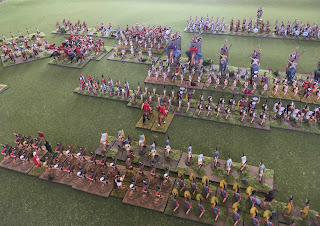This game was played on 11th June and is the most recent of those that we have played during the period Nov '16–June '17 when I lost my 'urge' to blog. We used Zimmermann's "The Wargamer's Handbook", that old set that I have enjoyed using since Mark introduced them to me a couple of years ago. We have now compiled the rules for ancients into a document and set of tables that we can refer to (both of documents are works 'in progress').
Mark put together the game largely based on the scenario in the Warhammer Ancient Battles supplement Hannibal and the Punic Wars. and with reference to Patrick Waterson's palindromic-titled article Amazed I Am Ere I Made Zama from The Slingshot no. 262 (2009), He also supplied the troops, table (and venue), as he so often does!
I took the bait and played as Roman...
Nah, actually it is good taking the side that was trounced historically as you can only do better, or else it goes according to the 'script', so fair enough. Either way you cannot lose, surely?!!
The forces were arrayed on opposite sides of the open plain.
Regulus' 15 000 infantry formed the large centre, deployed in the usual four lines: velites, hastati, principes and triarii with his 500 cavalry split between the flanks.
Xanthippus had 12 000 infantry, 4 000 cavalry and 100 war elephants. He placed the Carthaginian spearmen in the centre, mercenary infantry on the right with light infantry and Carthaginian/Numidian cavalry split between the two flanks. Those 100 war elephants formed the front rank of his centre.
This was according to the historical record (map from Wikimedia Commons).
As were the opening moves: bring on the pachyderms!
Elephants are from Zvezda (left) and Hät (right) War Elephants sets. Velites by Hät.
The velites evaded, leaving the hastati to try to stop the crazy grey beasts.
They passed the panic test, but were no match for the lunging Loxodontini...
(Roman figures mainly from Hät, some from Zvezda at right of photo).
(Roman figures mainly from Hät, some from Zvezda at right of photo).
who pursued through to the principes.
Pachyderm pursuit soon turned to...
mayhem for the Romans!
Regulus sent his cavalry in a 'death or glory' charge in an attempt to break up the Carthaginian attacks on both flanks. On the right, they were at first successful against the Carthaginian cav. (in distance), but pursuing onto the light infantry came unstuck.
Taking stock after the initial shock of the elephants, the Roman line reformed, but would it hold?
The best form of defence is attack! Desperate Roman counter-attacks, but are they merely delaying the inevitable?
Not much sign of the Roman lines in this broad view of the battle.
On the Roman right the triarii have driven back the cavalry and skirmishers-—for now.
The Roman left was under great pressure from a hail of javelins delivered by Numidian cavalry and skirmishers.
(The keen-eyed will notice the Atlantic figures in the foreground amongst those from Hät and Zvezda).
The pressured Roman army looks like a hollow square, assaulted from the left...
centre
and right!
Brief respite. A successful counter-charge by the left-most hastati and principes, drove off Carthaginian cavalry, taking many of their fellows with them.
In the centre though, the Carthaginian phalanx ground forward.
The battle had reached its climax, with what was to be a last turn of desperate mêlées.
Successful against their 'revised' foe, they continued towards the messed-up Roman rear; messing it up all over again.
So, what at first seemed to be 'disaster', then turned triumph—combined with the successful attacks of the Carthaginian spearmen—meant that it was curtains for the Romans.
A victory to Carthage, but in this we did not completely follow the history. Our version was far closer with only 20-odd figures difference in 'casualties': 121 v 100.
This was a fast-moving, challenging game. Being Roman, I was always trying to regain order and put ad-hoc formations into some kind of attack formation. As Carthaginian, Mark kept me on the back foot all game, trying to get his troops into contact as fast as possible.
Since changing to Zimmermann for our games of ancients (this was our third game using these rules) I have been far happier with the 'feel' of the games as well as specific mechanics. This was the first time that we have used elephants and those rules seemed to work well, including having them pursue automatically (our addition to the rules) and going 'awry' (as per original rules).





























Well done Carthago...and James, nice report with splendid troops!
ReplyDeleteThanks Phil. It was a really enjoyable and challenging game.
DeleteWonderful game. Sorry I missed it! But the funny thing is, every game in every period feels good with Zimmermann. To me as well. Either Zimmermann has discovered something fundamental about warfare, or at least wargaming, that has eluded everyone else, or he was a shrewd analyst of human nature. Or both.
ReplyDeleteDunno. They would not be for all tastes, for sure--no set is. Perhaps it is as simple as, given that I/we like and appreciate the overall mechanics (which I reckon have some genuine elegance to them) and because he introduces important nuances to simulate the specifics of each period they all have a sameness that is appealing and admired with specificity that means it is not really a 'one size fits all' approach?
DeleteAnother great looking game James, and with elephants - what could be better!
ReplyDeleteIt is great having them on the table, especially in such numbers, even when they are ploughing through your lines!
DeleteSurely a day to trumpet about for the Pachyderms! I remember seeing Zimmerman years and years ago, but never bought a copy or played them.
ReplyDeleteMark has more elephant outings planned. A bit of 'successor' action, I do believe!
Delete